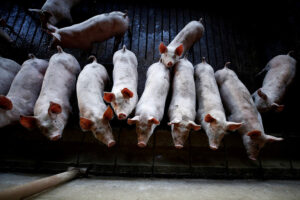By Kyle Aristophere T. Atienza, Reporter
FILIPINOS may have to face rising pork prices pending repairs at the San Juanico Bridge, which stretches from Samar to Leyte in central Philippines, and amid rising fuel prices due to the war between Israel and Iran, according to industry players.
Local producers would be forced to pass on to consumers the additional logistical costs of about P4-P6 per kilo of pork due to the bridge disruption, Chester Warren Y. Tan, president at the National Federation of Hog Farmers, Inc., told reporters on the sidelines of a livestock conference on Wednesday.
He said producers must pay for an additional Roll-on, Roll-off (RoRo) vessel to ship hogs from the Visayas to Mindanao, with the cost of each cargo truck averaging P40,000 to P60,000.
Before the bridge repair, they only needed two RoRo vessels to transport the hogs, he pointed out.
“Instead of just two RoRos, it’s now three,” he said in Filipino. “That’s an additional cost of P40,000-P60,000. That’s P4-P6 per kilogram.”
“Right now, producers are trying to absorb [the additional expenses]. But if they can no longer subsidize it, they might pass it on to consumers,” he added.
“That’s a big thing for us,” he said, referring to the logistical expenses that consumers might need to absorb.
Restrictions such as a three-ton load limit have been imposed on San Juanico Bridge, which connects Leyte and Samar provinces in the Visayas, after authorities flagged its decaying structural components.
Only light vehicles carrying loads not exceeding three metric tons may cross one of the Philippines’ oldest bridges. Heavy vehicles including cargo trucks and buses have been banned from using the bridge.
About 1,400 cargo trucks had been crossing the 2.16-kilometer bridge before the disruption.
The limit has prompted the declaration of a state of emergency in Samar province and Tacloban City to prevent any potential price hikes.
After the restrictions, the government ordered the use of alternative routes such as the RoRo route from Calbayog, Samar to Ormoc, Leyte, which takes 12 to 15 hours and costs more.
Mr. Tan said the disruption mainly affecting the transport of goods from the Visayas and Mindanao could also affect pork supply in Metro Manila.
Trade Secretary Ma. Cristina A. Roque on June 18 said freight companies had signified they would not increase delivery rates.
Agriculture Assistant Secretary for Swine and Poultry Michael J. Garcia said rising oil prices amid Israel-Iran war might affect logistic costs for pork products.
Pork Producers Federation of the Philippines President Eric M. Harina said the industry is monitoring the global prices of farm inputs such as feeds.
Pork prices have been rising even before the Israel-Iran war, with the government imposing a maximum suggested retail price (MSRP) for pork in March.
The MSRP was lifted in May on the request of hog players, who are still dealing with the African Swine Fever (ASF).
The Department of Agriculture has said it takes about at least three years to repopulate five million hogs that had been culled due to the ASF.
The agency is set to implement another MSRP for imported or frozen pork in July, which it views as a short-term solution to high prices.
“The Iran-Israel war has caused a sharp appreciation of the US dollar,” Jesus C. Cham, president of the Meat Importers and Traders Association, said in a Viber message. “This will result in higher landed costs.”
Agriculture Secretary Francisco Tiu Laurel, Jr. earlier said the MSRP would depend on the exchange rate and freight costs.
Mr. Tan said the prices of pork would stabilize once local production improves.
“We encourage our local farmers to produce more, to expand more,” he said. “In that case, if we have more production, our cost to produce will be lower and automatically, prices will be lower.”
